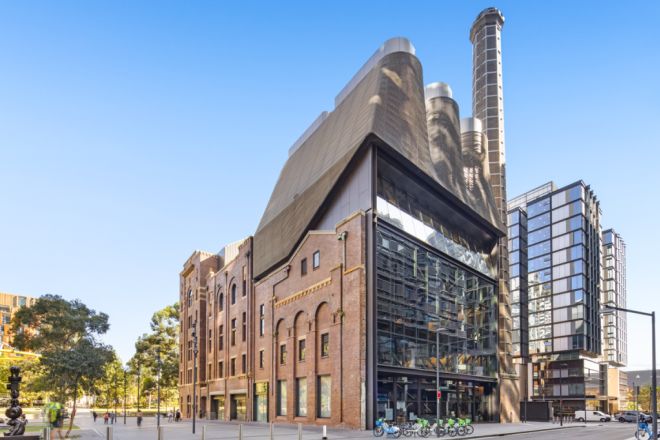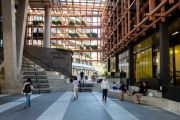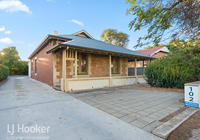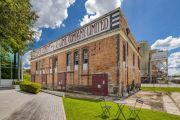
Afterpay's adaptive reuse Sydney HQ The Brewery complete, IP Generation still seeks $140m
A grungy-meets-hip vibe emanates from a former polluted heritage brewery turned sustainable Sydney office for lending fintech giant Afterpay, says an architect behind its transformation.
The Brewery is an award-winning adaptive reuse design in the heart of Sydney’s most exciting innovation and technology precinct.
“It’s not your typical Wall Street or sort of Martin Place, Sydney CBD financial centre,” says Yi-han Cao, associate director at Tzannes, the firm behind its 20-year master plan.
“It is more of a tech centre with a bit of character, grungy and hip.”
The former Carlton and United Breweries site in Chippendale, which was cordoned off to the public as it lay dormant for many years, has completed its architectural transition into a vibrant commercial and retail hub – soon to get even busier once its eateries arrive.
The opening of the public plaza, dotted by sculptures, allows residents to use the historic brewery for the first time.
The now almost fully tenanted 5791-square-metre building, built by Icon Construction and Total Constructions, was active for 170 years until the Kent Brewery ceased operations in 2003.
“The public can now engage with one of Sydney’s most historic places in a way that’s never been possible before,” says Cao.
The building’s original facades were restored and reinterpreted with new glass, steel, and zinc, complementing existing aged brickwork and sandstone. End-of-trip facilities and modern technology were fitted out inside.
Now, all that remains is for the Korean-inspired food outlets to open on the ground floor, and for final new tenants to clinch deals to secure the remaining 733-square-metres of available office digs on the top two floors.
The Brewery’s owners, investment firm IP Generation, which acquired the heritage building for $16.5 million in 2019 and invested $44 million in refurbishments, have yet to secure a buyer more than a year after listing it for $140 million with agents at Cushman & Wakefield and JLL.
“[That’s] pretty good ROI in six years,” says a source, who did not wish to be named.
A listing for the heritage site, advertised now only by Cushman & Wakefield, states The Brewery was poised to benefit from inner Sydney’s infrastructure boom, strategically forming part of the $2 billion award-winning Central Park Precinct and the $3 billion transformation of Central Station.
Colliers International, with Karbon Commercial, are marketing The Brewery’s last remaining office space, nestled in Central Park, a large residential and retail development, close to Central Station and the University of Technology Sydney. They are touting a five-star NABERS Energy rating.
Tenants on-site include family-run Vuza Hospitality Group, global artificial intelligence and programming firm MIQ, IP Generation, as well as anchor tenant Afterpay, which moved in last year.
Afterpay’s US-parent company, Block, also nabbed space for its other tech offerings, Square, Cash App, TBD and TIDAL, though a flexible work model still exists.
Block acquired Afterpay, the Australian buy now, pay later start-up founded in 214 by Nick Molnar and Anthony Eisen, in 2022.
“I have to say, Afterpay took the best space,” says Cao.
“But still, I think being in that building, you you get a sense that you know you don’t need to really have a sleek, all glass building to create a really viable and exciting workplace.”
Vuza oversees two Korean-inspired food outlets: Buttered – a bakery cafe combining sourdough and Korean desserts; and a street food outlet, Hongdae Pocha.
This will bring the precinct to life as a vibrant, mostly residential area surrounded by apartments, with a public park on two sides, a plaza with sculptures, and a nearby shopping mall. Cao says adding a commercial element enhances diversity and activates the space.
The Brewery Yard is Sydney’s first and largest example of a precinct-wide tri-generation facility integrated as part of adaptive reuse, Cao adds.
“Buildings like The Brewery don’t just age, they accumulate a story and cultural value that are irreplaceable. People will now continue to love this building for many years to come.”
To figure out where to start on the project 20 years ago, the firm carried out a feasibility study with different stakeholders.
“This is before the current owner, to figure out what’s the best use or best adapted reuse of a really polluted form of factory building,” says Cao.
The firm explored turning the site into a hotel, student housing, apartments, and a university campus before settling on a mixed-use commercial space.
“I think was probably the most suited … it just means we were able to maximise the floor space,” he adds.
Tzannes has won multiple awards for the adaptive reuse project, including a UNESCO award for Cultural Heritage Conservation, praising it as “a prototype for repurposing industrial heritage in a sustainable, forward-looking manner”.
“The Brewery Yard is a very significant part of Sydney’s history. Preserving it through adaptive reuse means it will be remembered and enjoyed well into the future while taking on a life of its own,” Cao adds.
The Brewery is part of the broader six-hectare site Brewery Yard, which integrates six early 20th-century buildings with underground plant equipment and an above-ground, gas-powered tri-generation plant powering parts of the Central Park precinct.
A tri-generation system is a combined heating, cooling and power generation from a single power source.
“Anchored by one of Australia’s largest fintech companies Afterpay, The Brewery’s 6.3 year WALE is further bolstered by MIQ Digital, IP Generation and a leading Sydney hospitality group occupying 20 per cent of the income in a new 10 year lease,” according to the Cushman & Wakefield listing for the site.











